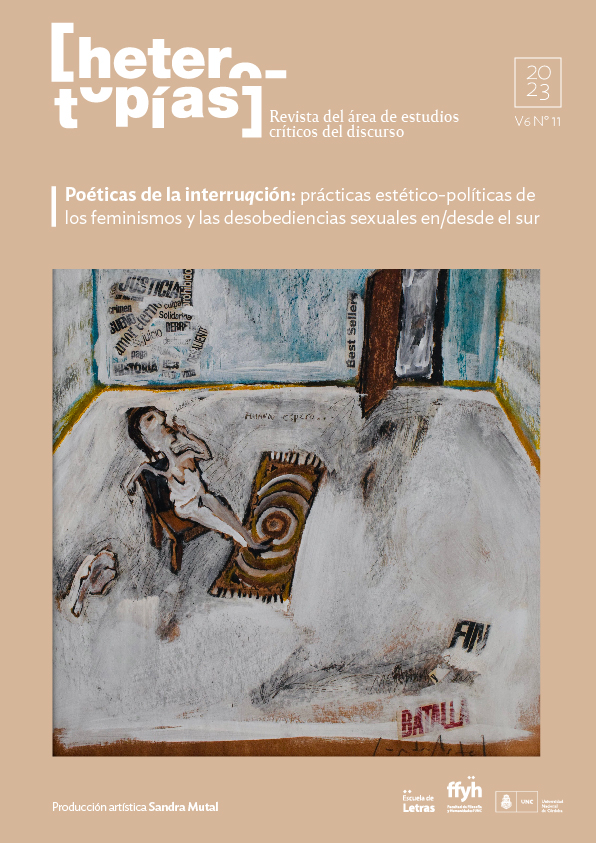Speculative fiction: dystopias between the local and the global
Main Article Content
Abstract
According to Donna Haraway’s definitions, we understand science fiction as a speculative artifact that allows us to think of a present that is absent, but possible, among the ruins of a present that is impossible, but real. In the last two decades, there has been an expansion of fictional discourses, globalized audiovisual series as local literary productions, inscribed in a dystopian mode of science fiction, but also in fantasy and other forms of alternate worlds creation. In many of these discourses, human reproduction in its biological sense takes a central place. We will approach a number of audiovisual fictions (series), globally distributed (The Handmaid's Tale, The House of the Dragon, Helix, Orphan Black, Westworld) in dialogue with local literary productions such as Cadáver Exquisito (Exquisite Corpse), Episodios de cacería (Hunting Episodes), Distancia de rescate (Rescue Distance), all from the last decade (2013-2023). The discussion on the material and affective configuration of a body as human travels through genres, discourses and geographical and time frontiers to bring light on dystopian zones of the extratextual present of our experiences. The stories we will analyze revolve around the topic of human body (re)production as a conflict between technology and humanity, copy and repetition, individual and State, nature (environment) and technology (capitalist production) showing the sharpest faces of their confrontation, pointing at the same time that those dystopian extremes are already here, in the impossible present of our existence.
Downloads
Article Details

This work is licensed under a Creative Commons Attribution-NonCommercial-ShareAlike 4.0 International License.
Those authors who have publications with this journal, accept the following terms: Those authors who have publications with this journal, accept the following terms:
a. The authors will keep their copyright and guarantee to the journal the right of first publication of their work, which will be simultaneously subject to the Creative Commons Attribution - Non-Commercial - Share Alike (by-nc-sa) Attribution License; no commercial use of the original work or any derivative works is allowed, the distribution of which must be done with a license equal to the one that regulates the original work.
b. Authors may adopt other non-exclusive license agreements for the distribution of the published version of the work (e.g., deposit it in an institutional telematic archive or publish it in a monographic volume) provided that the initial publication in this journal is indicated.
c. Authors are allowed and recommended to disseminate their work through the Internet (e.g. in institutional telematic archives or on their website) before and during the submission process, which may lead to interesting exchanges and increase the number of citations of the published work. (See The effect of open access).
References
Atwood, M. (2017). Introducción. El cuento de la criada. Barcelona: Salamandra, pp. 11-19.
Bazterrica, A. (2022). Cadáver exquisito. Buenos Aires: Alfaguara Cannavacciuolo, M. (2018). El cuerpo en contra: Episodios de cacería de Jimena Néspolo. Orillas, 7, pp. 195-218. Recuperado en http://orillas.cab.unipd.it/orillas/articoli/numero_7/02Cannavacciuolo_arribos.pdf Coliva, Y. (2022, 26 de septiembre). House of the Dragon 1×6: el parto como forma de trabajo forzado. Revista Hush. Recuperado en https://revistahush.com/house-of-the-dragon-1x6-la-violencia-del-parto Condal, R. y Martin, G.R.R. (creadores) (2022) La casa del dragón [serie de televisión], Estados Unidos: HBO Correa Fiz, V. (2022, 1 de junio ). Distancia de rescate: una eco-distopía en tiempo presente. Cuadernos Hispanoamericanos. Recuperado en https://cuadernoshispanoamericanos.com/distancia-de-rescate-una-eco-distopia-en-tiempo-presente/
Curiel Rivera, A. (2018, noviembre). La distopía literaria. Revista de la Universidad de México. Recuperado en https://www.revistadelauniversidad.mx/articles/743b7a3a-b732-4900-84b0-8ae0267eff9a/la-distopia-literaria
Felitti, K. y Ramírez Morales, M. D. (2020). Pañuelos verdes por el aborto legal: historia, significados y circulaciones en Argentina y México. Encartes, 05, pp. 110-145. Recuperado en https://encartes.mx/felitti-ramirez-panuelos-verdes-aborto-argentina-mexico/
García, M. P. (2018). Una ola feminista recorre el mundo. Altamirano Ayelén et al, La cuarta ola feminista, Buenos Aires: Emilio Ulises Bosia/Mala Junta, pp. 15-23.
Haraway, D. (1999) Las promesas de los monstruos. Política y Sociedad, 30, Madrid, p. 121-163.
(2019) Seguir con el problema. Generar parentesco en el Chthuluceno Bilbao: Ed. Consonni
Hester, H. (2018) Xenofeminismo, Buenos Aires: Caja Negra
Miller, B. (productor) (2017). El cuento de la criada [serie de televisión]. Estados Unidos: Hulu
Manson, G. y Fawcett, J. (creadores) (2013) Orphan Black.[serie de televisión] Canadá: Space y BBC America
Néspolo, J. (2015) Episodios de cacería, Buenos Aires: Santiago Arcos.
Nolan, J. y Joy, L. (creadores) (2016) Westworld. [serie de televisión] Estados Unidos: HBO
Porsandeh, C. (creador) (2014) Helix [serie de televisión], Estados Unidos: SyFy
Preciado, P. (2014, 29 de enero) Huelga de úteros Revista Números Rojos. Recuperado en https://blogs.publico.es/numeros-rojos/2014/01/29/huelga-de-uteros/
Reati, F. (2014) Clonación, distopía posthumana y pérdida de la identidad en El corazón de Doli de Gustavo Nielsen. Bracamonte J. y Marengo M. (comps) Juego de espejos. Otredades y cambios en el sistema literario argentino contemporáneo. Córdoba: Alción
Saer, JJ., (1997). El concepto de ficción. Buenos Aires: Ariel
Schweblin, S. (2015). Distancia de rescate. Buenos Aires: Random House.
